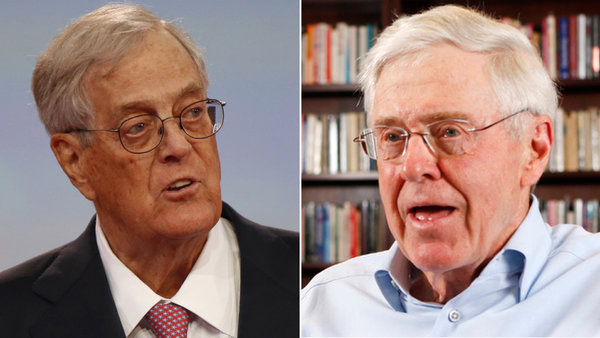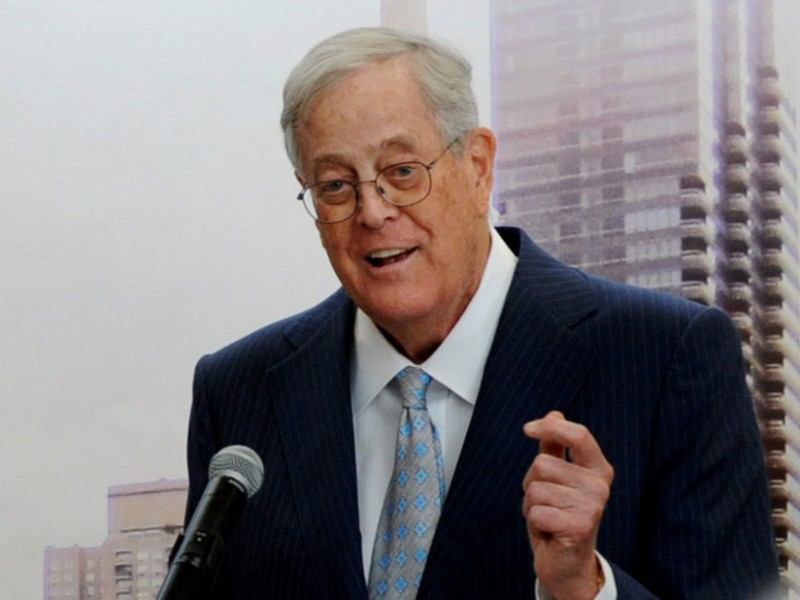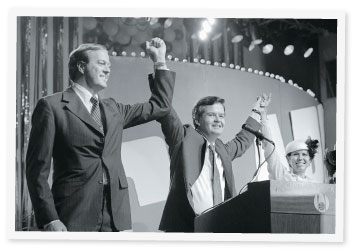The Koch brothers have launched an extraordinary campaign to take control of America’s most respected libertarian think tank. Will they destroy it?
-By David Weigel
March 5, 2012- On Friday afternoon, as the Washington offices of the Cato Institute were emptying out for the weekend, the libertarian think tank’s president sent an e-mail to all staff. The subject was the Koch brothers crisis.
“Catoites,” wrote Ed Crane, “You are all probably aware by now of the unfortunate development with Charles and David Koch. They are in the process of trying to take over the Cato Institute and, in my opinion, reduce it to a partisan adjunct to Americans for Prosperity, the activist GOP group they control.”
His fellow Catoites were waiting for this. On Thursday morning, the Washington Post published news of a lawsuit the Kochs had filed against the 35-year-old libertarian think tank, claiming that they could buy the controlling shares held by the late co-founder and chairman William Niskanen. A “Save Cato” page materialized on Facebook; Cato staffers, on their public pages, were telling friends to join. On Friday, before he sent out the e-mail, Crane summoned some of his top scholars for a special briefing on the Koch crisis. Attendees described it as a “war meeting,” with Crane pledging to stay on and fight the lawsuit as long as it could be fought. This was basically what Crane would say in his all-Cato e-mail.
“Cato is the gold standard of libertarian organizations around the world,” wrote Crane. “We are respected and admired for our commitment to libertarian principles, integrity, independence and non-partisanship. That respect encompasses traditional liberals and conservatives. That would all end with a Koch takeover, despite Charles Koch's protestations to the contrary.”
How did this happen, and why should anyone outside of the libertarian sphere care about it? The first question has a complicated answer. The second question answers itself.
Charles and David Koch have been putting some of their hard-won oil wealth into libertarian causes since the 1970s. A lot of the money has gone to theoretical, academic research—Cato, the Mercatus Center,* internship programs for college students. Charles Koch had helped to found Cato in 1977, but in 1991, he bolted; the think tank wasn’t producing his kind of results. David joined Cato as Charles left, becoming a minority partner, present but not really policing the think tank’s work.
In 2009, after Barack Obama’s Democrats passed health care legislation and tried to pass a cap-and-trade energy tax, the Kochs stepped up their political activism. Americans for Prosperity, a grass-roots organizing group chaired by David Koch, helped build the Tea Party movement with conferences, bus tours, and punditry; its budget grew from $7 million pre-Obama to $40 million in 2010.
The Cato Institute had never been so directly involved in politics. Its scholars had criticized Republicans when they were in power; they criticized Democrats when they started ruining things their own way. But if other Koch-connected organizations were at war with Obama, Cato largely sat it out. When the Occupy Wall Street movement began, Americans for Prosperity denounced its “violent rhetoric.” Jim Harper, director of information policy studies at Cato, blogged a Venn diagram and wrote that “to the extent the substance of [Occupy Wall Street’s] grievance is, or can be turned to, corporations’ use of government power to win unjust power and profits for themselves, that’s a grievance I can sit in a drum circle for.” In 2011, according to Cato chairman of the board Bob Levy, the think tank got no money whatsoever from the Kochs.
On Oct. 26, 2011, Niskanen passed away. Within days, Crane learned that the Kochs would be coming after the Cato shares held by Niskansen’s widow, arguing that they were not hers to hold. A win would give them complete control of the think tank, with a supermajority to make key hiring decisions; that, Crane was led to believe, would end his 35-year tenure as president.
In early November, David Koch met with Bob Levy, chairman of Cato’s board of directors, at Dulles International Airport. They were joined by Richard Fink, Koch's chief adviser, and Kevin Gentry, a vice president of Charles Koch’s charitable foundation who’d been put on Cato’s board of directors. (Former Americans for Prosperity President Nancy Pfotenhauer had joined the board after the same meeting.)
“They said that a principle goal was to defeat Barack Obama,” remembered Levy. “The way David [Koch] put it was, ‘We would like you to provide intellectual ammunition that we can then use at Americans for Prosperity and our allied organizations.’ AFP and others would apply Cato's work to advance their electoral goals.”




'Slate: Cato Goes to War' have no comments
Be the first to comment this post!